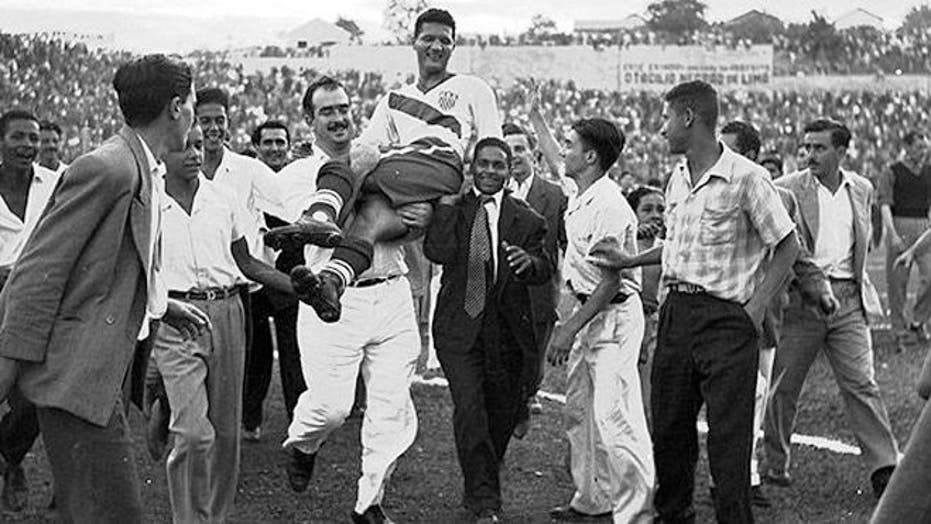Mention the name Belo Horizonte to an English soccer fan and he or she will probably wince.
Mention the Brazilian mining city to a U.S. soccer fan and he or she will probably smile.
Mention it to any other soccer fan in the world, and he or she will probably say it was one of the greatest, if not the greatest, upset in the history of the World Cup.
June 29, 1950: USA 1, England 0.
A result so improbable that many newspaper editors in the United Kingdom felt sure that a number “1” had been left off the front of the English score.
John Thompson of the Daily Mail reported that the English were losing to a “team I never knew played football.”
Oh, they played football that June 29, 1950 afternoon, as the Americans vanquished a vaunted English side that was making its first World Cup appearance. (The country’s football association didn’t participate in the qualifiers because of a dispute with FIFA that started in 1928 and didn’t get cleared up before World War II cancelled two Cups.)
English manager Walter Winterbottom had an array of stars on his squad, which had been insured by Lloyd’s of London for $3 million — an enormous sum for the time.
England was considered one of the tournament favorites along with host Brazil.
The Americans? They were glorified amateurs and semi-pros who played in the American Soccer League and local leagues, some of whom go paid $25 a game.
Midfielder Walter Bahr, one of two surviving members of that U.S. side (goalkeeper Frank Borghi is the other) and who was inducted into the U.S. National Soccer Hall of Fame, once said, “1950 is ancient history. You don’t want to live in it. But you don’t want to forget about it.”
No one has forgotten that game, that’s for certain.
“At the time, I didn’t realize how big a victory it really was,” Bahr said. “We weren’t that familiar with the World Cup. The United States wasn’t familiar with the whole concept of the World Cup. As the years went by, the significance of that victory has become [clearer].”
But that did not stop the underdog Americans from putting on a gritty and gutsy performance for the ages.
The game turned dramatically in the 37th minute when Bahr took a throw-in from Ed McIlvenny 35 yards out on the right side. He dribbled about 10 yards before taking a shot that was headed to the far post.
"The goalkeeper had to move to his right to get the ball and somehow Joe Gaetjens came from that side and deflected it with his head,” he said.
Gaetjens, a Haitian-born forward who was a U.S. resident but not an American citizen, headed the ball past goalkeeper Bert Williams and into the net for an improbable 1-0 lead.
It was a glancing blow off Gaetjens’ head, and Williams would claim that the Haitian got lucky.
“It wasn’t an accident,” Bahr insisted. “He got to the ball by design. The ball itself was a deflection. It wasn’t a clean head ball, but he has to get credit for getting his head on the ball.”
The U.S. players were expecting the roof to cave in.
“We [would have been] happy to get off the field with maybe a 2-0, 3-0 or 4-0 loss and to get a goal like that — maybe we had awakened the sleeping giant,” Bahr said.
They had. The English redoubled their efforts on the attack and lashed balls that bounced off the posts and crossbar of the American goal.
And there was a different kind of near-miss, too.
With 20 minutes remaining, the English forward, Stan Mortensen, had the ball and a clear path to the American keeper, Borghi.
That’s when USA midfielder Charles Colombo tackled him from behind at the edge of the penalty area, flirting with danger — not to mention a potentially game-tying penalty kick.
“Charlie took a head-long dive and hit him right in the back of the knees,” defender Harry Keough said in 1987, “a tackle anybody in the NFL would have been proud of.”
“The momentum they [had], they both were at the penalty spot when they stopped. Charlie bulldozed him all the way. [Mortensen] was mad as hell, as anybody would have been. The referee came up and yelled at Charlie. Charlie claimed the referee said, ‘Buono, buono’” — good in Italian.
When the final whistle sounded, fans raced onto the field and hoisted the Americans onto their shoulders.
“Boy, I feel sorry for these bastards,” Keough told teammate Frank “Pee Wee” Wallace. “How are they ever going to live down the fact we beat them?”
The English would lose their last game at the Cup 1-0 as well, to Spain, and then return home humbled. But in the long run, they got off relatively easily. In 1966, England got to host the World Cup, and beat West Germany, 4-2, for the championship.
By contrast, it would be four decades before the U.S. would again participate in a World Cup, in Italy in 1990.
The most tragic fate was suffered by the man who scored the game’s only goal.
In 1953, Gaetjens returned to his native land and continued to play soccer there, even playing for Haiti in a Cup qualifier against Mexico that same year.
Eleven years later, he was taken into custody by the Tonton Macoute—the paramilitary organization that helped prop up the regime of Papa Doc Duvalier. It’s presumed that he died in prison or was executed as a political prisoner.
His body was never recovered.









































